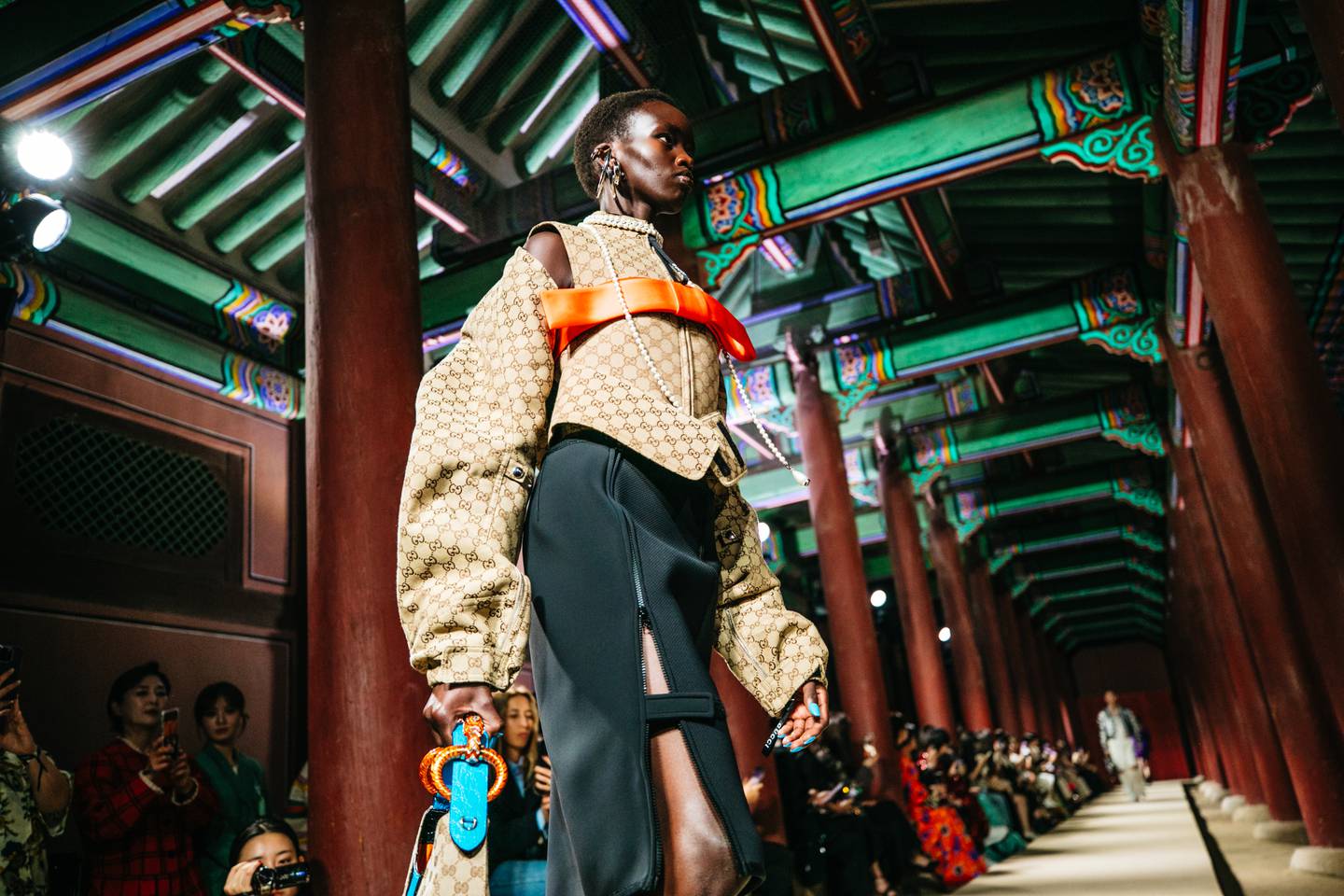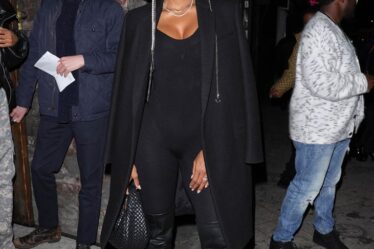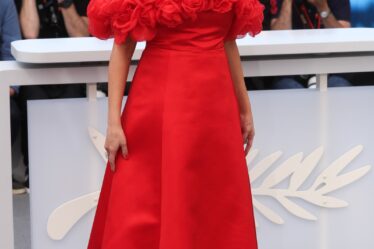
It’s generally the case that brands partner with Amazon — and accept all the baggage that comes with that — because they have to. Victoria’s Secret is no exception.
The lingerie giant announced this week that it would begin selling its bras, underwear and swimwear on the e-commerce platform. Not coincidentally, Victoria’s Secret last week reported that sales fell 5 percent in the first quarter from a year ago, its fifth straight quarter of decline. Comparable sales, a metric of store performance, dropped 11 percent compared to the first quarter of 2022.
The cold streak casts doubt on the company’s reboot, which included a spinoff from parent company L Brands and a pivot away from the sexualised messaging it had leaned on for decades. A more inclusive approach to marketing included a new slate of ambassadors announced in 2021, including soccer star Megan Rapinoe, plus-size model Paloma Elsesser and trans model and activist Valentina Sampaio.
Victoria’s Secret has had more success with its bottom line. It reported net income of $81 million in 2022 and $174 million in 2021, when retailers across the board experienced booming demand, though that metric fell to just $1 million in the most recent quarter. Analysts agree a new strategy of taking on less inventory and reducing promotions — selling less to earn more — is the right approach. Investors are less convinced: Shares hit a post-spinoff low of $17.62 on Thursday and are down by about half this year.
A high-profile wholesale partnership addresses the chain’s problems, at least in theory: It gets product in front of customers who have no reason to set foot in a Victoria’s Secret or Pink store, or even the malls they inhabit. It’s not the only brand to reach this conclusion. Macy’s and footwear retailers announced this week that Nike will be returning to their stores. Many formerly direct-to-consumer brands, including Glossier and Allbirds, have embraced wholesale as well.
“The world has returned to understanding that wholesale partnerships are not evil. In fact, they can prove the most profitable way to scale,” said Simeon Siegel, an analyst at BMO Capital Markets.
But Amazon isn’t Macy’s or Sephora. The e-commerce company has for more than two decades been viewed as an existential threat to conventional retail. It’s been blamed (with varying degrees of accuracy) for waves of store closures and bankruptcies. Whereas brands control how consumers experience their products in stores, on Amazon their merchandise is presented as a commodity: a search for women’s underwear yields more than 10,000 results. Brands often find their products listed alongside unauthorised third-party sellers, knockoffs and Amazon’s own Essentials line.
This lack of control has kept many companies off the platform, including brands that will happily work with other wholesale retailers. Nike and Birkenstock have partnered with Amazon in the past, only to pull out in the face of these challenges. Few major luxury brands sell through Amazon.
For the right brands, and when done in the right way, working with Amazon can be a win for both sides, not just the e-commerce behemoth. Many small brands use Amazon to boost sales early on, with customers finding them via product searches rather than expensive Instagram ads. Amazon does allow brands to create landing pages that are a step up from the endless grid. Some large retailers have found innovative ways to use Amazon’s reach, including Kohl’s, which allows customers to return their packages in its stores.
“Amazon works well for certain types of brands: generally those that aren’t super luxury or high-end and are less concerned with brand-equity dilution due to being on a mainstream platform,” said Alex Song, co-founder and chairman of Innovation Department, a portfolio company that scales early-stage brands through selling on Amazon.
For Victoria’s Secret, Song added, as an established retailer with deep brand awareness among consumers, Amazon’s commodifying effect isn’t as harmful as it would be for newer companies.
Other mall retailers struggling to compete with newcomers should consider making the same move as Victoria’s Secret, Song said.
“In this environment, efficiency matters and getting to your customers where they are matters,” he said.
For its part, Victoria’s Secret isn’t jumping into the deep end of the Amazon marketplace without testing the waters first. It began selling cosmetics on the platform last April, a partnership that has brought new customers to the retailer, the company said.
“We’re very, very, very pleased with the results there,” Greg Unis, chief growth officer at Victoria’s Secret, told shareholders at the company’s investor day last October. “They’ve been great partners to us and the customers responded really well.”
Ultimately, a sale is a sale — especially as Victoria’s Secret continues to scale back its brick-and-mortar footprint. The key lies in weighing brand value and brand reach, according to Siegel.
“At the end of the day, all brands need to balance exclusivity and distribution,” he said.
THE NEWS IN BRIEF
FASHION, BUSINESS AND THE ECONOMY
The Independents Group raises $400 million, and looks to double in size by 2025. The luxury marketing and communications group — parent to Karla Otto and influencer marketing firm Lefty — raised $400 million in a round led by TowerBrook Capital Partners and media, gaming and online sports betting company, FL Entertainment.
Zara-Owner Inditex enjoys a strong start to summer. The company said on Wednesday sales of its spring-summer collection gathered pace to jump 16 percent in May, as the retailer mitigates higher wage costs and keeps customers onside during a cost of living crisis.
Can Zara Owner Inditex hold the line on pricing? Investors will closely watch Zara owner Inditex’s profit margins for any signs of weakness after a stellar series of results confirmed its lead over smaller Swedish rival H&M.
Neiman Marcus earnings hit by steep discounts. Neiman Marcus’s third-quarter earnings declined as the retailer was forced to offer more promotions to contend with weaker demand for luxury goods, according to people with knowledge of the closely held firm’s financial results.
Rent the Runway sees rising workwear demand. Rent the Runway Inc. said demand for workwear has been surging as more subscribers are going to the office more regularly, underpinning stronger-than-expected revenue growth in the most recent quarter.
Prada, Zegna acquired a minority stake in knitwear firm Fedeli. Prada and Ermenegildo Zegna on Tuesday said they have acquired a minority stake in Luigi Fedeli e Figlio, highlighting the importance of high-quality knitwear in the luxury segment.
Stitch Fix to explore exiting UK market in 2024. The online personalised styling service firm said on Tuesday it would explore exiting the UK market in its fiscal year 2024, blaming a weakening macro environment and increasing costs.
Armani tests sustainable cotton production in Italy. Luxury fashion house Armani Group has started an experimental agroforestry plantation in southern Italy to test new ways to produce cotton sustainably, it said on Monday.
Telfar to end its Bag Security Program. Telfar said Wednesday that next week’s Bag Security Program drop would be its last.
Zara Owner Inditex considers fund to back environmental startups. Inditex SA, which owns the Zara clothing chain, is considering setting up a vehicle to invest in startups and technologies that it hopes could help green its business, according to people familiar with the matter.
Victoria’s Secret to sell apparel on Amazon. After launching Victoria’s Secret beauty products on Amazon, the lingerie brand is expanding to include apparel on the retail platform.
‘Stop Shein’ campaign launches in France backed by MEP Raphaël Glucksmann. French campaigners are calling on the country’s government to “Stop Shein,” ratcheting up political pressure on the controversial ultra-fast-fashion giant.
The story behind Australian fashion’s decline. Over the last three decades, a combination of local and global forces have twice reshaped the Australian fashion industry, creating pressures that make it harder for independent designers to thrive.
PEOPLE

Satoshi Kuwata’s Setchu wins the 2023 LVMH Prize. The Savile Row-trained Japanese designer will receive a grant of €400,000 and mentoring by luxury’s biggest group. Italy’s Magliano and London-based Bettter, winners of the runner-up Karl Lagerfeld prize, will receive €200,000 each.
Maison Margiela names Gaetano Sciuto CEO, Stefano Rosso Chairman. Sciuto will take up the chief executive role at the OTB-owned label next month, succeeding Gianfranco Gianangeli.
Grace Wales Bonner wins BFC/GQ Designer Fashion Fund. London-based designer Grace Wales Bonner has won this year’s British Fashion Council/GQ Designer Fashion Fund, the BFC said Wednesday.
Saudi Brand Ashi Studio invited to show at Paris Haute Couture Week. Founder Mohammed Ashi becomes the first couturier from the Gulf region known to join the Fédération de la Haute Couture as a guest member and will show on the official calendar on July 6.
MEDIA AND TECHNOLOGY

Louis Vuitton to sell €39,000 NFTs. The luxury brand launched its first saleable NFTs, and at €39,000, consumers can purchase one of Louis Vuitton’s Via Treasure Trunks.
TikTok seeks $20 billion e-commerce business despite US setback. ByteDance aims to more than quadruple the size of the platform’s global e-commerce business to as much as $20 billion in merchandise sales this year, banking on rapid growth in Southeast Asia.
Compiled by Sarah Elson.



